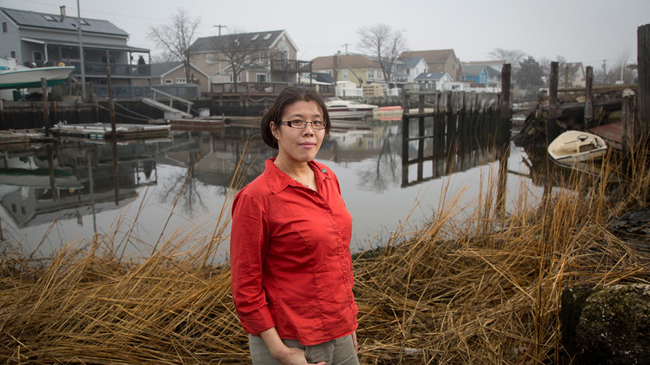
As climate change threatens coastal areas, experts from the New York Sea Grant program are involved in a project to protect the state’s shorelines and the people who live near them. Above, Helen Cheng, coastal resilience specialist at New York Sea Grant and the Nature-Based Shorelines Project’s lead for the New York City region. Credit: Jason Koski/Cornell Brand Communications.
— Filed by: Ryan Strother for Cornell Chronicle and Cornell CALS online
New York, NY, February 26, 2019 - As Earth’s climate changes and New York coastal communities face risks from unpredictable waters, Cornell researchers and other specialists are developing a framework to protect shorelines and the people who live near them.
Experts from New York Sea Grant (NYSG) are involved in the Nature-Based Shorelines Project to identify the best ways to evaluate wetlands, natural elements such as beach grass plantings, and nature-based features such as living shorelines. Coastal communities along the Great Lakes, Hudson River, Long Island and in New York City will be getting updated information about how to monitor and evaluate the performance of nature-based shorelines.
The project, managed and co-sponsored by New York Department of State and New York State Energy Research and Development Authority, will also examine how man-made structures provide benefits, such as social, ecological and physical shoreline stabilization. A final monitoring framework is expected by September.
Cornell impacting New York State
“A lot of people say, ‘Natural shorelines are great.’ But why are they great, and where are they great? This project takes a look at that,” said Helen Cheng, coastal resilience specialist at NYSG and the project’s lead for the New York City region. “I think this project will help provide a strong foundation of research and support for shoreline practices.”
NYSG, a cooperative program of Cornell University and the State University of New York, administers a network of integrated research and education services around the state. The organization’s personnel, relationships and partnerships throughout New York will provide a statewide perspective on the project.
From May through September 2018, NYSG staff served as workshop leads for the Great Lakes, New York City and Long Island regions. The specialists invited key stakeholders – waterfront practitioners, scientists and others with expertise in their respective regions – to provide feedback on the shoreline monitoring framework as well as discuss the nuances of shoreline management in each region.
The specialists facilitated conversations among regional stakeholders, including an overview of the three themes of indicators – ecological function, hazard mitigation and structural integrity, and socio-economic benefits – and parameters related to determining the success of approaches such as living shorelines.
The feedback received at each workshop will be incorporated into the final version of the monitoring framework.
Funding for a portion of the project – which includes testing the framework at pilot locations in the Great Lakes, Hudson Valley, Long Island and New York City areas – comes from a grant from the National Oceanic and Atmospheric Administration.
More Info: New York Sea Grant
New York Sea Grant (NYSG), a cooperative program of Cornell University
and the State University of New York (SUNY), is one of 33 university-based
programs under the National Oceanic and Atmospheric Administration’s
National Sea Grant College Program.
Since 1971, NYSG has represented a statewide network of integrated
research, education and extension services promoting coastal community
economic vitality, environmental sustainability and citizen awareness
and understanding about the State’s marine and Great Lakes resources.
Through NYSG’s efforts, the combined talents of university scientists
and extension specialists help develop and transfer science-based
information to many coastal user groups—businesses and industries,
federal, state and local government decision-makers and agency managers,
educators, the media and the interested public.
The program maintains Great Lakes offices at Cornell University, SUNY
Buffalo, SUNY Oswego and the Wayne County Cooperative Extension office
in Newark. In the State's marine waters, NYSG has offices at Stony Brook
University in Long Island, Brooklyn College and Cornell Cooperative
Extension in NYC and Kingston in the Hudson Valley.
For updates on Sea Grant activities: www.nyseagrant.org has RSS, Facebook, Twitter, and YouTube links. NYSG offers a free e-list sign up via www.nyseagrant.org/nycoastlines for its flagship publication, NY Coastlines/Currents, which is published quarterly. Our program also produces an occasional e-newsletter,"NOAA Sea Grant's Social Media Review," via its blog, www.nyseagrant.org/blog.